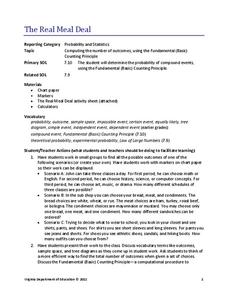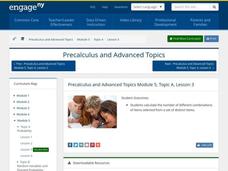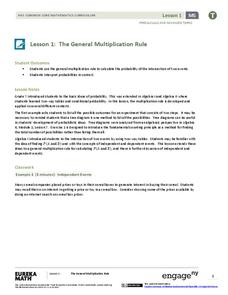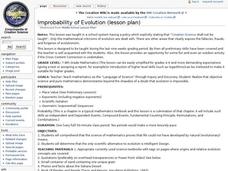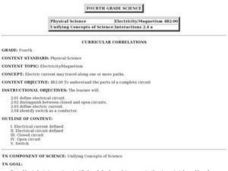EngageNY
Counting Rules—The Fundamental Counting Principle and Permutations
Count the benefits of using the resource. The second installment of a 21-part module focuses on the fundamental counting principle to determine the number of outcomes in a sample space. It formalizes concepts of permutations and...
Virginia Department of Education
The Real Meal Deal
Burgers and salads and sodas, oh my! Scholars use a menu to investigate the Fundamental Counting Principle. They create tree diagrams to illustrate the number of possible choices for each given scenario.
Curated OER
Students use fundamental counting principle to compute combinations and permutations
Students define Pascal's triangle and special notations used to represent nth elements. In this geometry lesson, students solve problems using permutations and combinations. They compare the formula for permutation to that of Pascal's...
EngageNY
Counting Rules—Combinations
Discover how combinations are different from permutations. In the third installment of a 21-part module, scholars learn how to determine combinations of objects. They learn to distinguish between situations where order is important and...
Noyce Foundation
Cubism
If cubism were a religion, would you follow it? Lower-level tasks focus primarily on counting the number cubes in a structure and relating the number to surface area. As learners progress to higher-level tasks, isometric drawings and...
Curated OER
Choices! Choices! Choices!
High schoolers explore the Fundamental Counting Principle and tree diagrams. In this secondary mathematics activity, students choose three pictures of clothing forma a catalog and create as many outfits as possible. High...
Balanced Assessment
MasterMind
Knowledge of statistics and probability can increase your advantage when playing games. The activity asks learners to analyze the game of MasterMind to determine the number of possible codes. They also examine different variations of the...
EngageNY
The General Multiplication Rule
In the first installment of a 21-part module, scholars build on previous understandings of probability to develop the multiplication rule for independent and dependent events. They use the rule to solve contextual problems.
Curated OER
Improbability of Evolution
Students disprove evolution. In this science lesson, students disprove evolution by attempting to prove that creation is the way it all began. They use the improbability that evolution could exist and expose its fallacies, frauds and...
Curated OER
Combination and Permutations
Students decide when to use computation and permutation to solve problems. In this algebra lesson, students apply the correct method to solve complex set of events. They differentiate between dependent and independent events.
Curated OER
Genetic Traits
Students supplement their study of genetics by collecting and analyzing information about their own and their classmates' characteristics and traits. Students create a database of traits and characteristics to compare and contrast.
Curated OER
Paths of Electrical Currents
Fourth graders examine the paths that electrical currents travel. They create a current of electricity using flashlights, bulbs, batteries, wires and tape. They determine how to create a closed circuit that will light the bulb. They...

